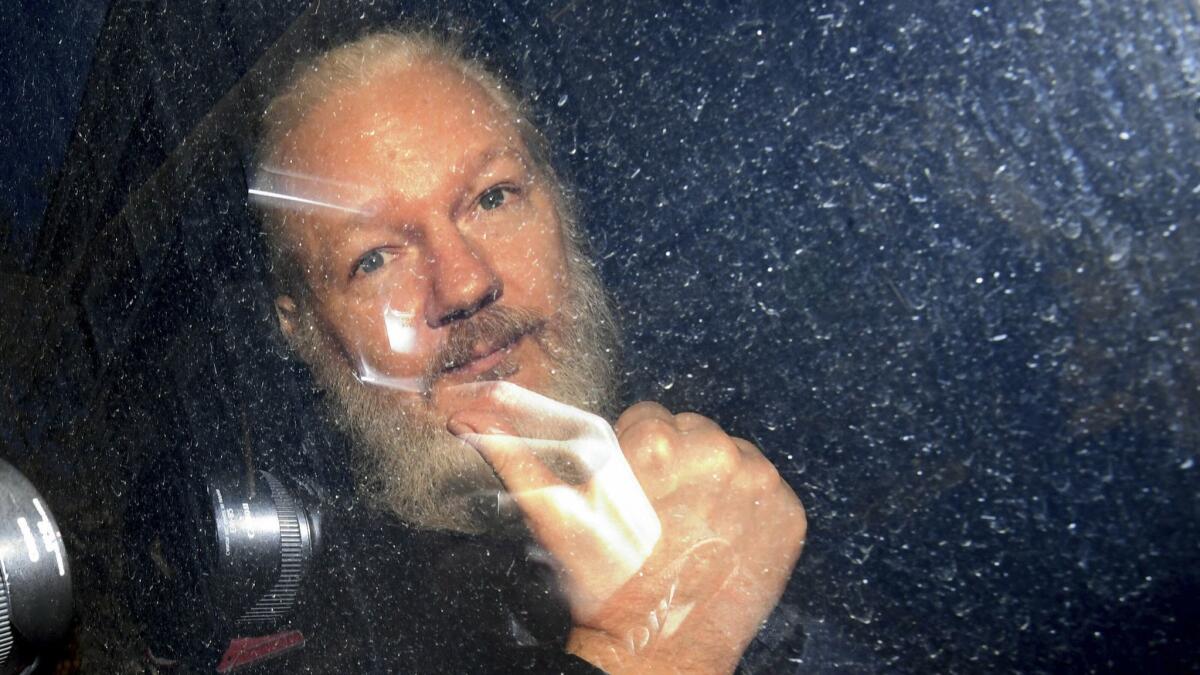Op-Ed: Why Julian Assange’s arrest is not a 1st Amendment issue

- Share via
The indictment unsealed in federal court against Julian Assange on Thursday accuses him of conspiring with Chelsea Manning to break passwords and gain access to top-secret government computers. If this is what Assange conspired to do, then he committed a federal crime, since hacking is not a 1st Amendment right — even if it was done for the noble purpose of exposing government wrongdoing.
Crucially, the indictment does not charge Assange with breaking the law for what was published on the WikiLeaks website. Under Supreme Court precedents, the press generally is protected by the 1st Amendment for what it publishes so long as it does not engage in illegal activity. For example, in New York Times vs. United States, the Supreme Court ruled in 1971 that the federal government could not stop newspapers from publishing the Pentagon Papers, a history of U.S. involvement in the Vietnam War, even though they were highly classified and had been illegally copied and removed from the Defense Department by an insider.
Similarly, in Bartnicki vs. Vopper, the court ruled in 2001 that a radio station and a radio talk show host could not be held liable when they broadcast a tape of a phone conversation that had been illegally intercepted and recorded. Notwithstanding the violations of the law, the 1st Amendment protected the media because none of its employees had participated in the illegality, and the conversation involved issues of importance concerning the local public schools.
Civil disobedience is not a defense to a crime; those who engage in it still must submit to punishment for their offenses.
The Assange case is different. He is being prosecuted not for what was published, but for his alleged involvement in a conspiracy to illegally obtain that material. The Constitution does not give reporters the right to break into buildings or computers to gather information, even for very important stories. In the Pentagon Papers case, for example, Daniel Ellsberg was prosecuted for allegedly having leaked the documents, although his case was ultimately thrown out because of the government’s misconduct in investigating him.
Some have decried Assange’s arrest because the documents obtained by Manning and published by WikiLeaks contained information of vital public concern. Manning turned over 700,000 documents. Among them was evidence that, between 2002 and 2009, the federal government continued to hold some individuals as prisoners in Guantanamo Bay, Cuba, even after they were found to have done nothing wrong and had long been cleared for release.
Enter the Fray: First takes on the news of the minute »
The documents also revealed that U.S. authorities failed to investigate hundreds of reports of abuse, torture, rape and murder by Iraqi police and soldiers. The classified reports indicated that the United States knew, but never acknowledged, that 100,000 people were killed in Iraq following the invasion of the country.
In these and many other disclosures, Manning and Assange gave the public enormously important information. But that does not provide a legal defense for hacking into the computers. Assange’s acts should be regarded as civil disobedience: breaking the law to achieve a greater good. Civil disobedience is not a defense to a crime; those who engage in it still must submit to punishment for their offenses.
Many of the same people who applaud WikiLeaks for publishing the Manning documents rightly decried the hacking of computers in the Democratic National Headquarters, which also led to documents disseminated by WikiLeaks. In both instances, a crime was committed — not in the publication of the documents, but in the hacking of the computers.
I confess that a part of me was rooting for Assange to remain in the Ecuadorean Embassy and avoid prosecution because of the importance of the material he brought to light. Still, if I were a judge sentencing Assange after a conviction, I would know that the law was justified in punishing him. That said, I would also take into account the public benefit of the documents he published.
Erwin Chemerinsky is dean of the UC Berkeley Law School.
More to Read
A cure for the common opinion
Get thought-provoking perspectives with our weekly newsletter.
You may occasionally receive promotional content from the Los Angeles Times.









